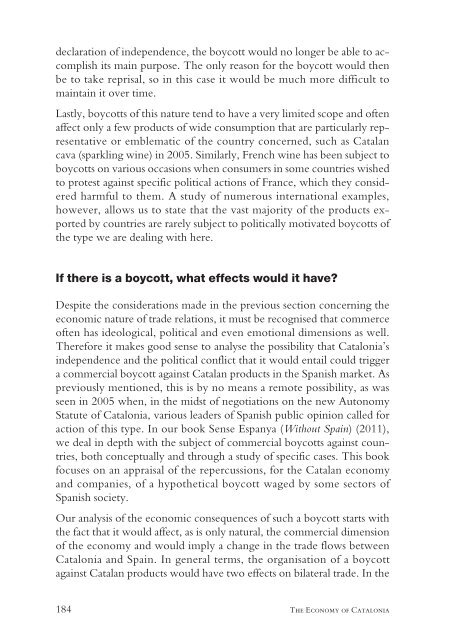The Economy of Catalonia
the_economy_of_catalonia._questions_and_answers_on_the_economic_impact_of_independence
the_economy_of_catalonia._questions_and_answers_on_the_economic_impact_of_independence
Create successful ePaper yourself
Turn your PDF publications into a flip-book with our unique Google optimized e-Paper software.
declaration <strong>of</strong> independence, the boycott would no longer be able to accomplish<br />
its main purpose. <strong>The</strong> only reason for the boycott would then<br />
be to take reprisal, so in this case it would be much more difficult to<br />
maintain it over time.<br />
Lastly, boycotts <strong>of</strong> this nature tend to have a very limited scope and <strong>of</strong>ten<br />
affect only a few products <strong>of</strong> wide consumption that are particularly representative<br />
or emblematic <strong>of</strong> the country concerned, such as Catalan<br />
cava (sparkling wine) in 2005. Similarly, French wine has been subject to<br />
boycotts on various occasions when consumers in some countries wished<br />
to protest against specific political actions <strong>of</strong> France, which they considered<br />
harmful to them. A study <strong>of</strong> numerous international examples,<br />
however, allows us to state that the vast majority <strong>of</strong> the products exported<br />
by countries are rarely subject to politically motivated boycotts <strong>of</strong><br />
the type we are dealing with here.<br />
If there is a boycott, what effects would it have?<br />
Despite the considerations made in the previous section concerning the<br />
economic nature <strong>of</strong> trade relations, it must be recognised that commerce<br />
<strong>of</strong>ten has ideological, political and even emotional dimensions as well.<br />
<strong>The</strong>refore it makes good sense to analyse the possibility that <strong>Catalonia</strong>’s<br />
independence and the political conflict that it would entail could trigger<br />
a commercial boycott against Catalan products in the Spanish market. As<br />
previously mentioned, this is by no means a remote possibility, as was<br />
seen in 2005 when, in the midst <strong>of</strong> negotiations on the new Autonomy<br />
Statute <strong>of</strong> <strong>Catalonia</strong>, various leaders <strong>of</strong> Spanish public opinion called for<br />
action <strong>of</strong> this type. In our book Sense Espanya (Without Spain) (2011),<br />
we deal in depth with the subject <strong>of</strong> commercial boycotts against countries,<br />
both conceptually and through a study <strong>of</strong> specific cases. This book<br />
focuses on an appraisal <strong>of</strong> the repercussions, for the Catalan economy<br />
and companies, <strong>of</strong> a hypothetical boycott waged by some sectors <strong>of</strong><br />
Spanish society.<br />
Our analysis <strong>of</strong> the economic consequences <strong>of</strong> such a boycott starts with<br />
the fact that it would affect, as is only natural, the commercial dimension<br />
<strong>of</strong> the economy and would imply a change in the trade flows between<br />
<strong>Catalonia</strong> and Spain. In general terms, the organisation <strong>of</strong> a boycott<br />
against Catalan products would have two effects on bilateral trade. In the<br />
184 <strong>The</strong> <strong>Economy</strong> <strong>of</strong> <strong>Catalonia</strong>


